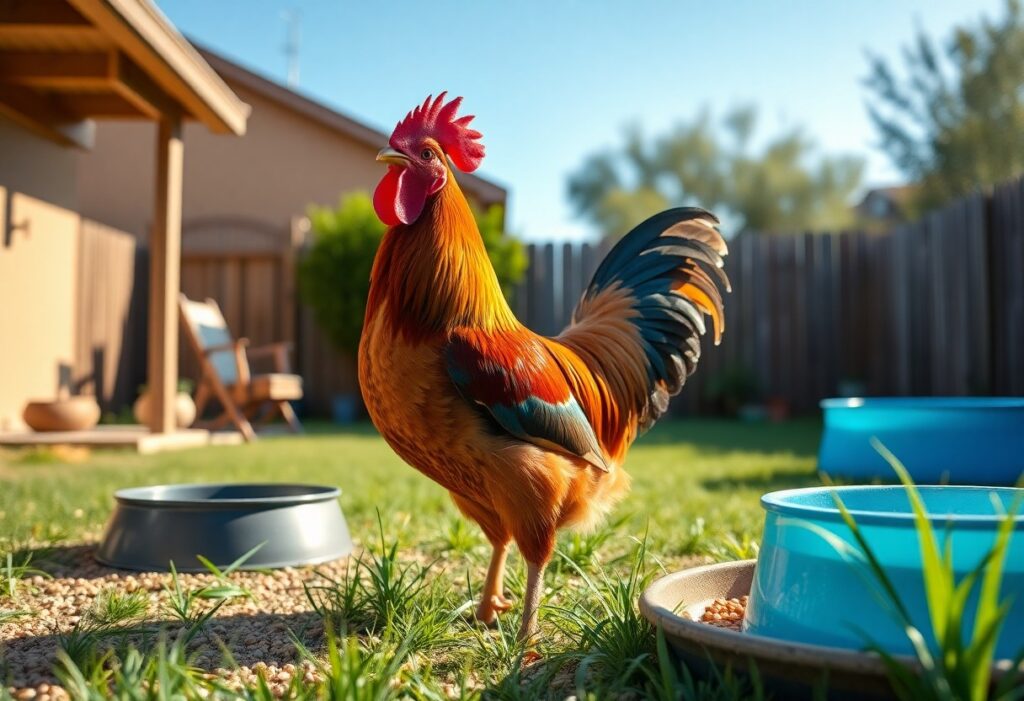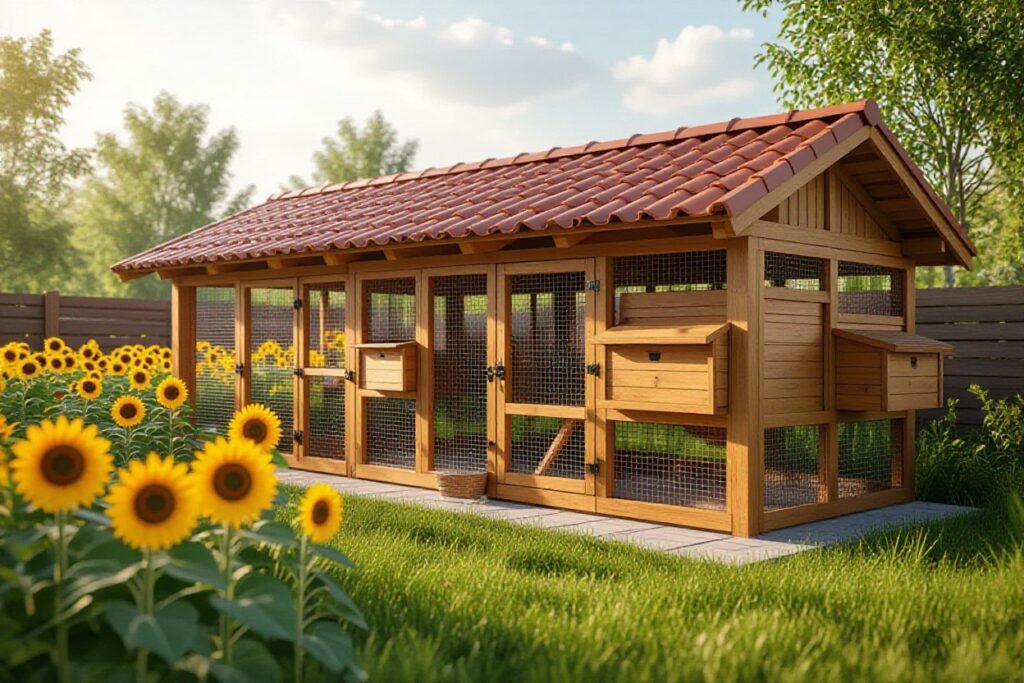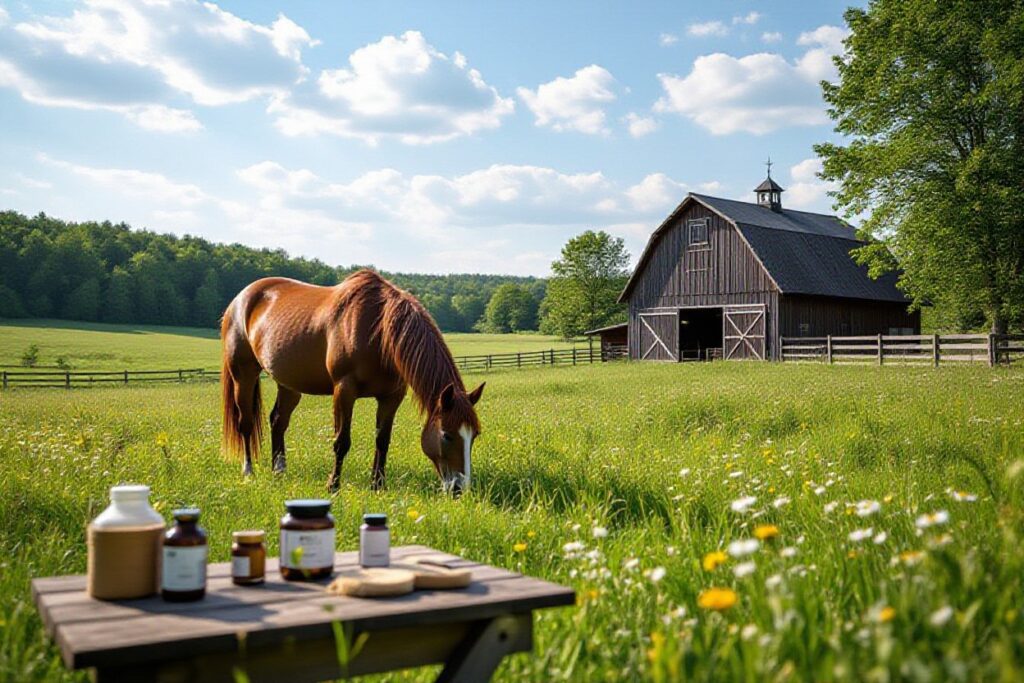Just like any other livestock, your roosters require specific care to thrive and remain productive. To help you prevent common health issues and ensure your flock stays vibrant, we’ve compiled a list of 10 vital tips that focus on nutrition, environment, and routine health checks. By following these guidelines, you can foster a healthier, happier rooster, leading to better egg production and overall flock performance. Let’s probe these key practices to enhance your roosters’ well-being throughout the year!
Key Takeaways:
- Regularly monitor diet and ensure access to clean water to support rooster vitality and overall health.
- Maintain a clean living environment to prevent the spread of diseases and promote well-being.
- Incorporate routine health checks and vaccinations to proactively manage health issues and ensure longevity.
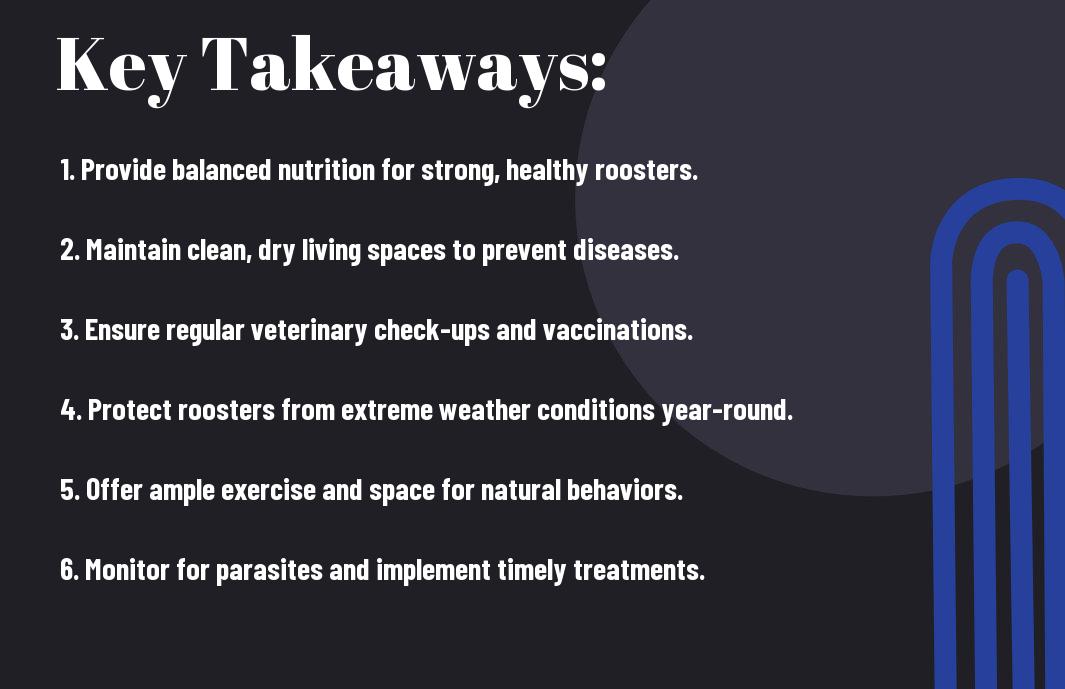
Provide Balanced Nutrition
While it’s vital to keep your roosters healthy, balanced nutrition plays a key role in their overall well-being. A combination of high-quality grains, proteins, vitamins, and minerals will ensure your roosters maintain optimal health and energy levels throughout the year. A well-rounded diet not only supports your roosters’ growth and productivity but also enhances their immunity and longevity.
Quality Feed Selection
Little attention to the type of feed you choose can lead to serious health problems in your roosters. Opt for high-quality, commercially prepared feeds that are formulated specifically for their nutritional needs. Look for feeds rich in protein and important nutrients to support their development and maintain their vitality.
Fresh Water Access
You’ll want to ensure that your roosters have constant access to fresh water, as it’s vital for their hydration and overall health. Clean, potable water encourages proper digestion and nutrient absorption, while also preventing dehydration and potential health issues.
You can improve your roosters’ health significantly by providing clean, fresh water daily. Dehydration can lead to serious complications, including kidney damage and decreased egg production in hens. Make sure to clean their water containers regularly to prevent contamination and illness. If possible, consider using a waterer that prevents debris from entering, ensuring that your roosters are drinking pure water at all times. Keep an eye on their water intake; not drinking enough water can stress your birds and lead to a compromised immune system.
Ensure Proper Housing
Some key considerations for maintaining your rooster’s health revolve around their housing environment. A well-structured coop provides shelter from harsh weather, protects them from predators, and offers a safe space for roaming and socializing. Ensure the coop is spacious enough for your rooster to move freely, as cramped conditions can lead to stress and aggression, negatively impacting their health.
Ventilation and Space
Ventilation is vital in maintaining a healthy environment for your rooster. Ensure your coop has proper airflow to prevent the buildup of harmful moisture and ammonia from droppings. This fresh air helps reduce respiratory issues and keeps your flock comfortable. Along with adequate ventilation, provide sufficient space; overcrowded conditions can contribute to stress and increase the likelihood of pecking order disputes.
Bedding Cleanliness
To foster a healthy living environment, you must prioritize bedding cleanliness. Regularly changing and maintaining clean bedding is vital for your rooster’s well-being. Dirty bedding can harbor harmful bacteria and parasites, which can lead to health issues and infections. You should aim to remove soiled bedding weekly and replace it with fresh materials like straw or wood shavings, as this promotes a drier and safer living space.
A clean coop contributes to your rooster’s overall health and happiness. In addition to preventing diseases, a well-kept bedding area encourages natural behaviors and comfort. Ensure that you frequently check for any signs of pests, and clean up droppings daily to minimize exposure to harmful pathogens. Implementing good cleanliness practices will not only protect your rooster’s health but also improve the quality of life for your entire flock.
Monitor Health Regularly
All aspects of your rooster’s health can be improved by consistently monitoring their condition. Regular health checks will help you detect any potential issues before they escalate into serious problems. Pay attention to their physical appearance, weight, and overall disposition. Keeping a close eye on your rooster will ensure that you are providing the best care possible year-round.
Observe Behavior Changes
While observing your rooster, any sudden changes in behavior may indicate health issues. Look for signs of lethargy, aggression, or changes in vocalization. Changes in social interactions with other birds can also be telling. By closely monitoring your rooster’s behavior, you can quickly identify when something isn’t right and take action if necessary.
Inspect for Parasites
Now, it’s important to inspect your rooster for signs of parasites regularly. These pesky invaders can negatively affect your bird’s health, leading to weight loss, lethargy, and even more severe issues. Check under the feathers for any signs of mites or lice, as well as examining the skin for irritation and redness. Keeping your rooster free of parasites is imperative for maintaining their overall health and vitality.
A thorough inspection for parasites requires diligence and an eye for detail. Focus on the areas where parasites often hide, such as around the vent and under the wings. Look for excessive scratching, bald patches, or any sticky residue that could signal a problem. Since some parasites can lead to serious health consequences, it’s important to act quickly if you see any signs. Medication is available for treatment, but prevention through regular cleaning and maintaining a hygienic living environment is your best defense against these invaders.
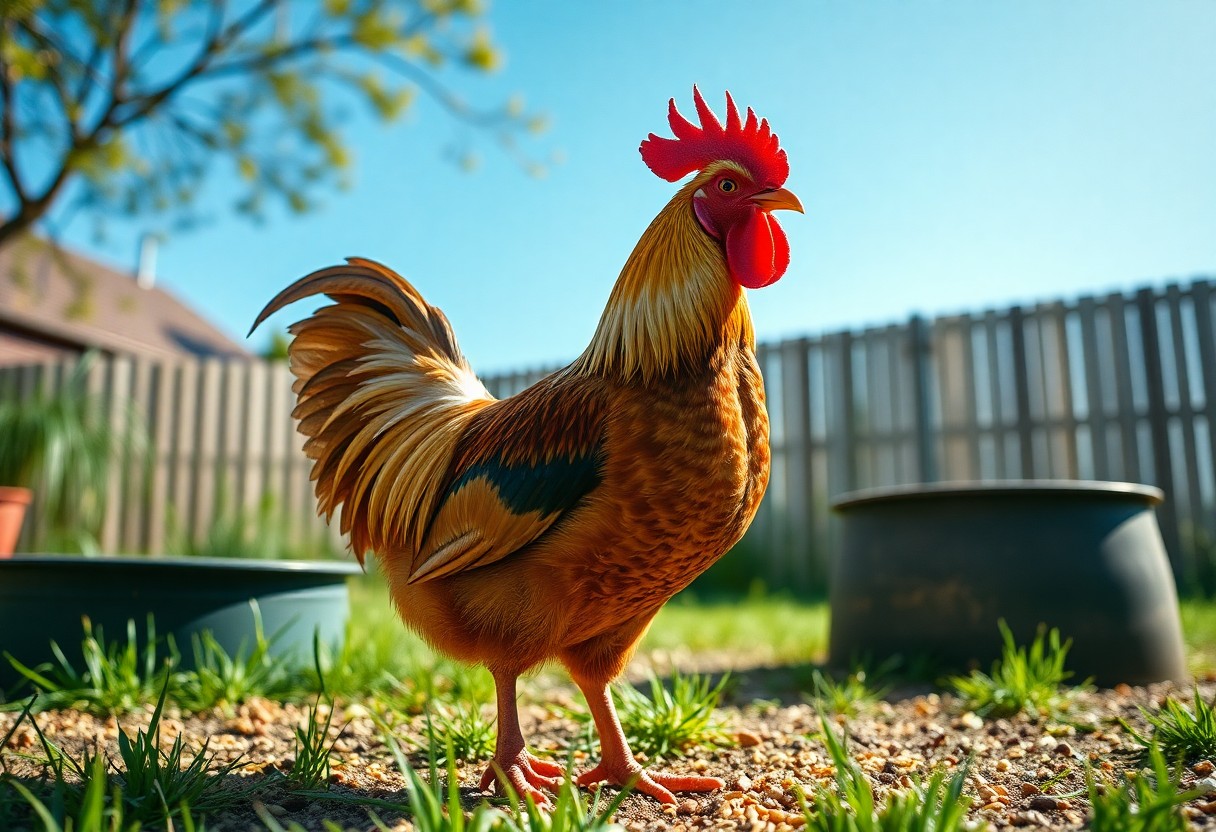
Practice Routine Vaccinations
Your roosters’ health is significantly enhanced through routine vaccinations. Vaccinating your birds against common poultry diseases can prevent outbreaks and minimize health risks. It is vital to establish a regular vaccination schedule appropriate for your region and adhere to it throughout the year to ensure your flock remains healthy and robust.
Consult with Veterinarians
Practice consulting with veterinarians to tailor a vaccination plan specific to your flock’s needs. A poultry veterinarian can provide vital insights into local health threats and recommend vaccinations effectively. They can also guide you on the best practices for immunization based on your roosters’ age and specific health conditions.
Keep Vaccination Records
Consult with your veterinarian to maintain comprehensive vaccination records for your roosters. This practice tracks which vaccines have been administered and helps schedule future immunizations. Keeping accurate records is vital for effective flock management and can protect your roosters from unexpected health challenges.
The significance of maintaining vaccination records cannot be overstated. Accurate records help you monitor your roosters’ vaccination history, ensuring no doses are missed. Moreover, this documentation is beneficial for biosecurity measures when introducing new birds to your flock or when engaging in shows and competitions. In case of health issues, these records can provide valuable insights, enabling your veterinarian to make informed decisions about potential outbreaks or treatments.
Maintain Proper Lighting
Many factors contribute to your rooster’s overall health, and one of the most significant is proper lighting. Adequate lighting boosts your rooster’s mood and encourages natural behaviors, which is necessary for their well-being. Aim for a consistent light schedule to help regulate their circadian rhythms, as this can improve their activity levels, reduce stress, and promote better reproductive health.
Natural Light Exposure
Naturally occurring sunlight is beneficial for your rooster. Ensure they have ample access to sunlight during the day, as it helps promote vitamin D synthesis and improves their immune system. If adequate sunlight isn’t possible outdoors, consider using full-spectrum light bulbs to mimic natural light and create a healthier environment for them.
Prevent Overcrowding
To maintain a healthy living environment for your rooster, it is necessary to prevent overcrowding. Overcrowded spaces can lead to increased stress levels, making your rooster more susceptible to diseases and behavioral issues. Provide enough space for your rooster to move around freely and avoid conflicts with other birds, as a well-spaced environment will foster a more harmonious and productive atmosphere.
For instance, allocating at least 4 square feet per rooster inside the coop can significantly enhance their quality of life. By ensuring they have adequate space, you mitigate the risks of injury and stress-related behavior, such as feather pecking or fighting. Additionally, consider implementing a proper ventilation system to further improve air quality and keep the coop comfortable, as this will promote not just a healthy living space, but also an overall happier and healthier rooster.
Keep Stress Minimal
Now, minimizing stress is crucial for your rooster’s health. Stress can lead to various issues, including weakened immune systems and aggressive behavior. By creating a calm environment and understanding your rooster’s needs, you can significantly improve their well-being. Regular interaction and mindful handling techniques will help establish trust, ultimately reducing anxiety.
Gentle Handling Techniques
Assuming you want to build a positive relationship with your rooster, gentle handling is key. Use slow, smooth movements when approaching. Always support them properly to prevent any feeling of insecurity, which can trigger fear or aggression. Speak softly and avoid sudden gestures to keep your rooster calm and comfortable.
Stable Environment
One of the best ways to enhance your rooster’s happiness and health is by providing a stable environment. This means maintaining consistent feeding schedules and ensuring that their living space is safe and secure. Frequent changes can cause stress, so minimize disruptions and keep their surroundings familiar.
Gentle adjustments in their habitat can make a significant difference. Ensure your roosters have access to a strong, secure coop and a large outdoor area to roam. Maintaining an appropriate temperature is crucial, as extremes can cause discomfort. Providing adequate shelter, clean water, and a consistent supply of feed will also promote a sense of security, further reducing stress. Your efforts to keep their environment stable will lead to healthier, happier roosters.
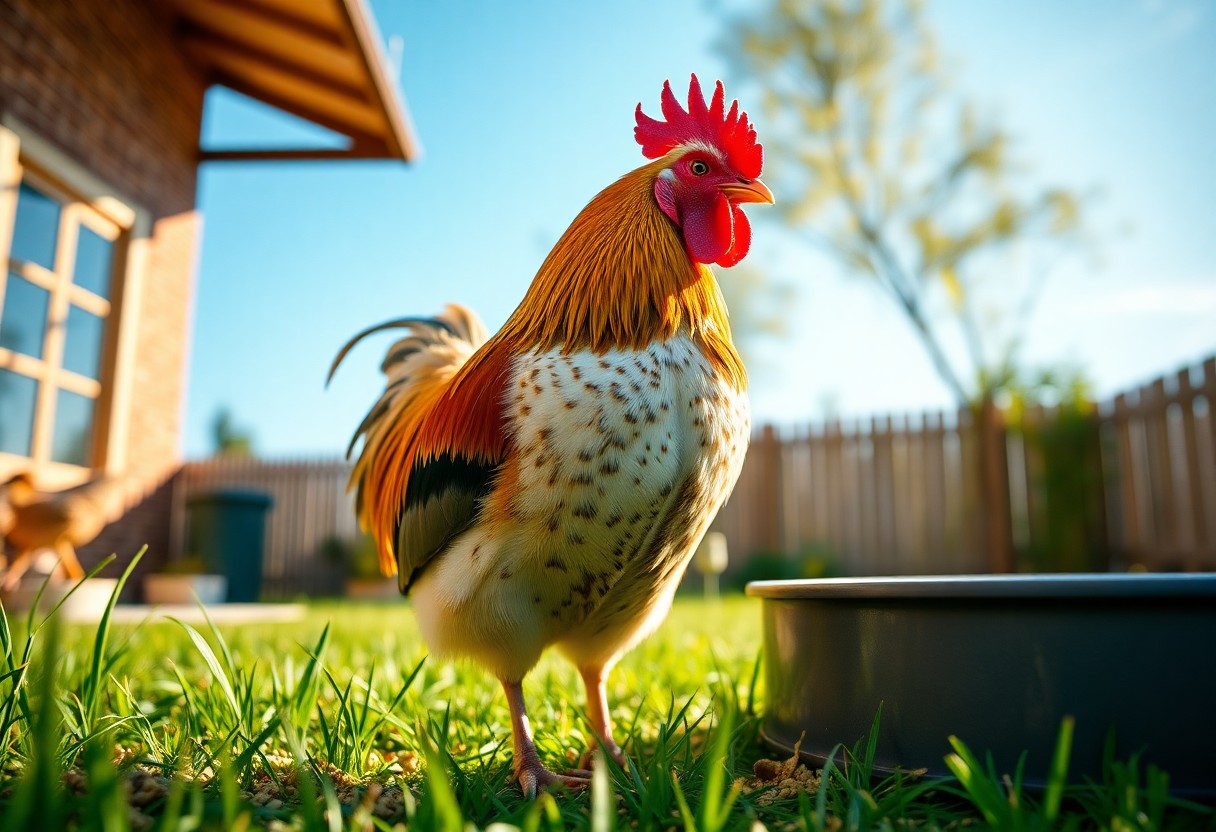
Practice Biosecurity Measures
Once again, maintaining optimal rooster health requires strict adherence to biosecurity measures. Keeping your roosters safe from disease and infections is vital for their overall well-being. Implementing protocols to limit the introduction of pathogens onto your property will help ensure your flock remains healthy. Regularly educating yourself on potential risks and employing these practices can significantly enhance the health of your roosters throughout the year.
Limit Outside Access
Some of the most effective biosecurity measures involve limiting outside access to your property. By controlling who and what enters your space, you can minimize the risk of introducing harmful pathogens. Designate specific areas for visitors, and consider implementing signage to inform guests of your biosecurity protocols. This proactive approach can help safeguard your roosters from disease outbreaks.
Clean Equipment Frequently
Measures to maintain cleanliness in your rooster’s environment should include frequent cleaning of all equipment. This includes feeders, waterers, and tools that come into contact with your flock. To reduce the risk of disease transmission, it is necessary to use a disinfectant solution appropriate for poultry. Regularly washing and sanitizing these items prevents the build-up of harmful bacteria and viruses that can compromise your roosters’ health. Always ensure that your cleaning practices focus on high-risk items and gear, as they can be primary carriers of disease pathogens. By prioritizing cleanliness, you foster a healthier environment for your roosters.
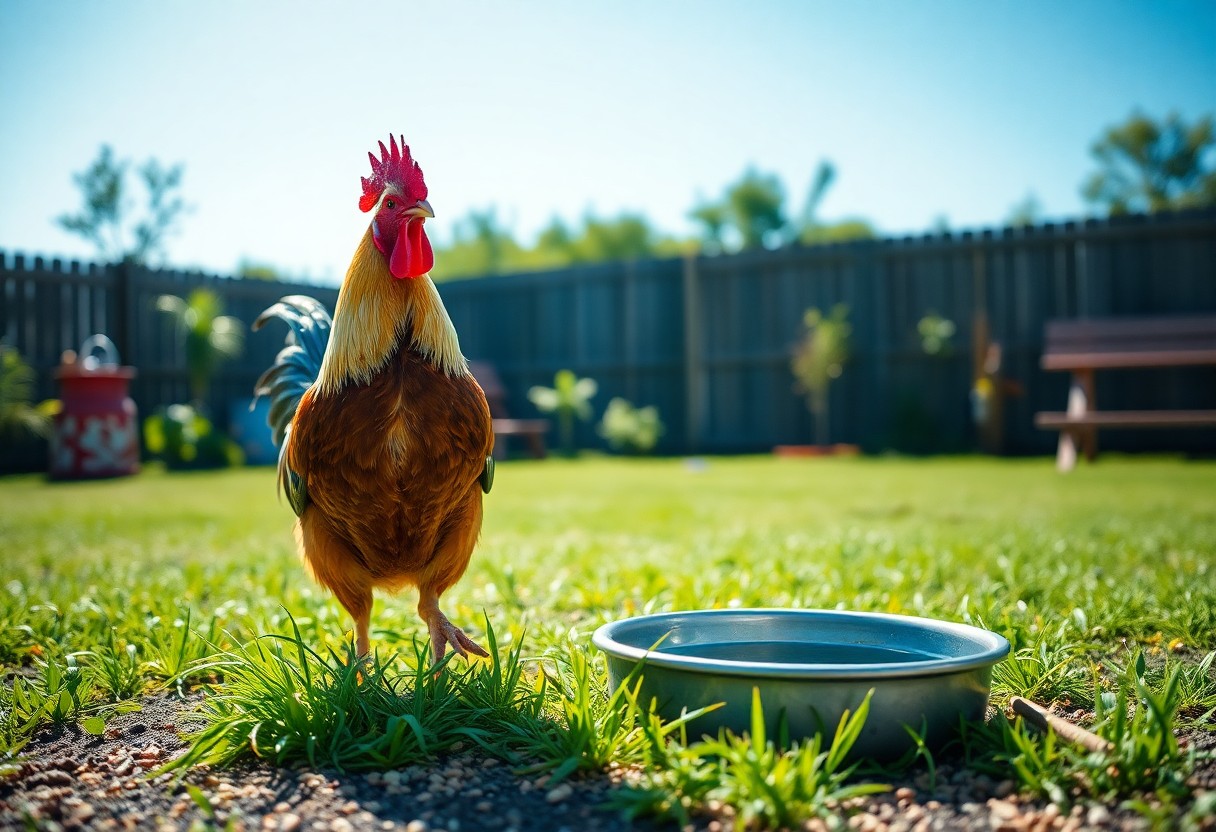
Encourage Social Interaction
To maintain optimal health in your roosters, it’s imperative to encourage social interaction. Roosters thrive in a social environment and benefit from the company of their flock. Regular interaction not only helps reduce stress but also supports their physical and mental well-being. Consider creating a spacious area where they can roam and engage with each other, promoting a harmonious atmosphere.
Flock Dynamics Awareness
With an understanding of flock dynamics, you can foster a healthy environment for your roosters. Tracking the hierarchy within your flock helps you identify potential conflicts and stressors. Healthy social interactions will promote positive behaviors and can ultimately lead to a happier, more productive flock.
Integrate New Members Slowly
To successfully integrate new members into your rooster flock, take a gradual approach. Introducing them suddenly can lead to stressful conflicts and disrupt existing social structures. Instead, allow roosters to become familiar with newcomers through limited, supervised interactions.
It’s important to implement a careful introduction process when adding new roosters to your flock. Start by keeping the newcomers in a separate area where they can see and hear the existing members without direct contact. Gradually increase their exposure time. Allowing them to slowly interact under your supervision will help to mitigate any potential aggression or dominance disputes. This prudent approach enables each rooster to acclimate while preserving the overall harmony of the flock.
Schedule Regular Check-Ups
Despite the natural robustness of roosters, scheduling regular check-ups with a veterinarian is crucial to ensure they remain healthy throughout the year. These visits help you stay informed about any potential health issues and allow for early detection of diseases, ensuring your rooster lives a long and vibrant life.
Veterinary Visits
You’ll want to establish a routine for veterinary visits at least once a year. These professionals can provide vaccinations, conduct health screenings, and offer tailored advice based on your rooster’s specific needs and environment.
Health Assessments
You’ll need to incorporate regular health assessments into your care routine. These evaluations can help track your rooster’s health status and identify any emerging concerns before they escalate into significant problems.
To perform effective health assessments, monitor your rooster for any changes in behavior, appetite, or egg production. Assess their feathers for signs of infestation or health issues and their eyes for any signs of discoloration or discharge. Regularly check their weight and overall body condition to ensure they are maintaining a healthy status. Being attentive to these signs will empower you to catch health problems early, allowing for timely interventions.
To wrap up
Upon reflecting on the 10 crucial tips for maintaining optimal rooster health year-round, it becomes clear that your proactive approach can significantly enhance the well-being of your flock. By ensuring proper nutrition, maintaining a clean environment, and providing regular veterinary care, you set the foundation for a healthy and productive rooster. Adopting these strategies will not only improve your roosters’ health but also contribute to their vitality and overall happiness, which directly benefits your poultry operation. Take these insights to heart and enjoy the rewarding experience of caring for your roosters effectively.
Q: What are the primary dietary needs for maintaining optimal rooster health?
A: A balanced diet is vital for maintaining the health of roosters. They require a mix of protein, carbohydrates, fats, vitamins, and minerals. Ensure their diet includes high-quality feed designed for poultry, which typically contains around 16-22% protein. Supplement their diet with fresh vegetables, grains, and occasional treats like grains or mealworms. Providing fresh, clean water daily is also vital. Avoid feeding them moldy or spoiled food, as it can lead to health issues.
Q: How can I create a suitable living environment for my roosters?
A: Roosters need a safe and comfortable living environment to thrive. Their housing should be spacious, well-ventilated, and secure from predators. Provide clean bedding, such as straw or wood shavings, to keep the area dry and comfortable. Ensure they have access to outdoor space where they can roam and engage in natural behaviors like scratching and foraging. Additionally, regular cleaning of their living space helps prevent the buildup of waste and reduces the risk of diseases.
Q: What preventive measures can I take to ensure my rooster stays healthy throughout the year?
A: To keep your rooster healthy year-round, prioritize routine health checks. Inspect them for signs of illness, such as changes in appetite, lethargy, or unusual behavior. Vaccinations and regular deworming should be part of their healthcare regimen, depending on your veterinarian’s recommendations. Additionally, maintaining a stress-free environment is vital; avoid overcrowding and ensure socialization among the flock. Monitoring their bedding and the cleanliness of their living area also helps minimize disease transmission.
